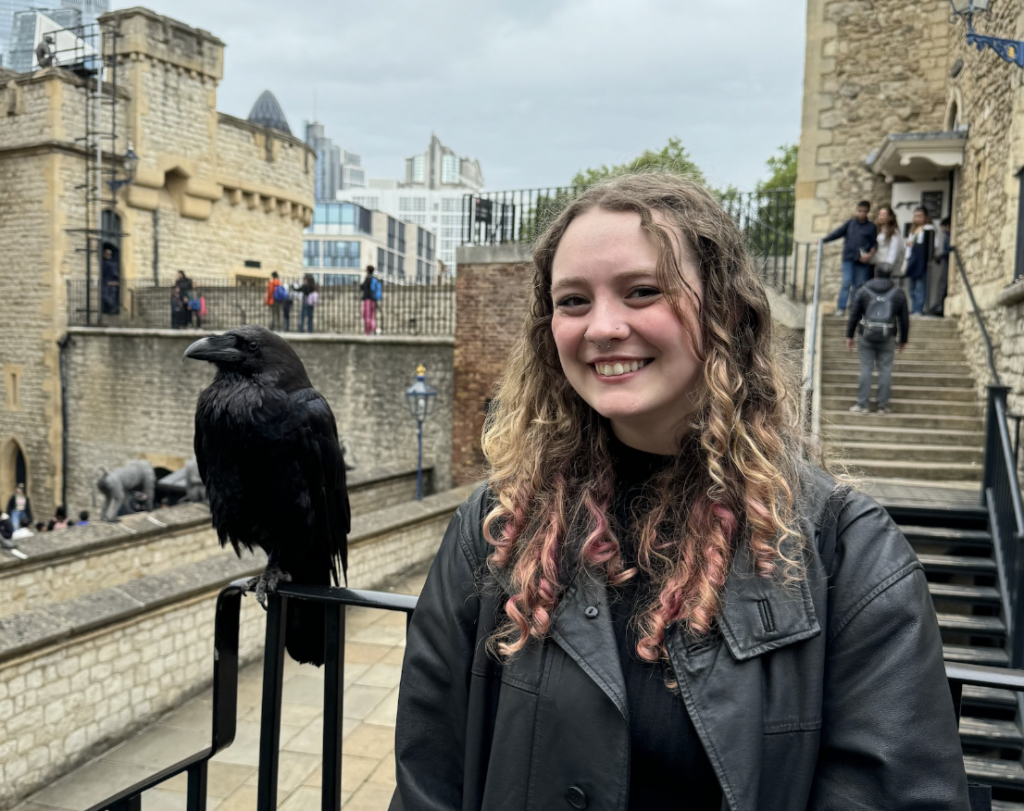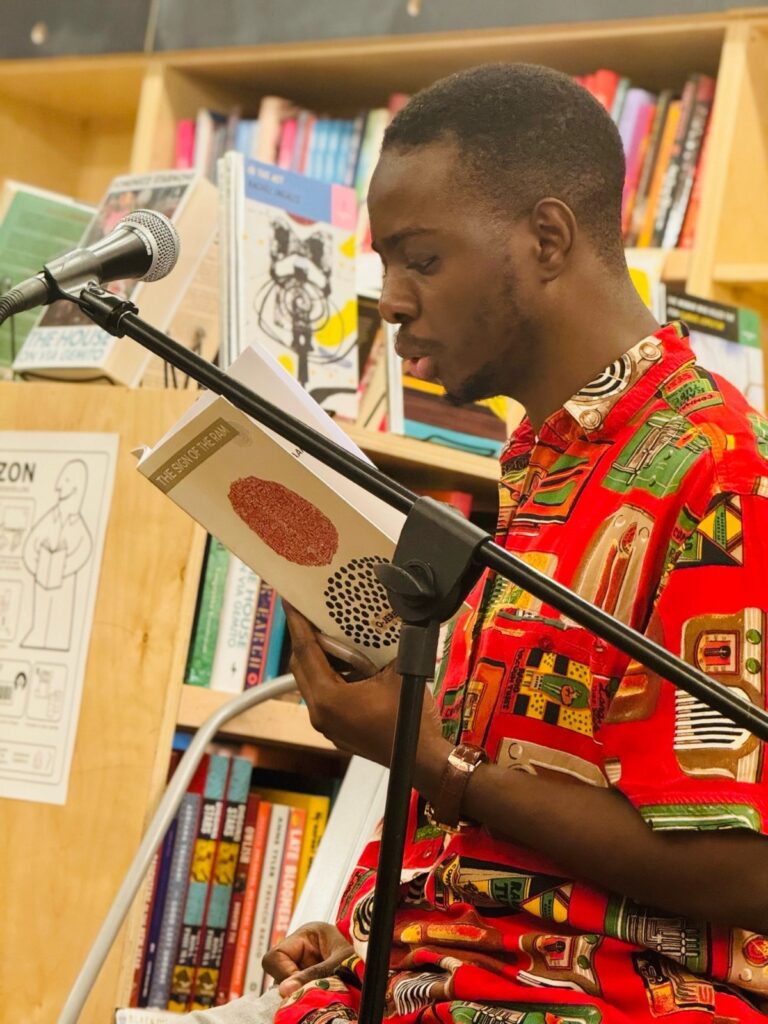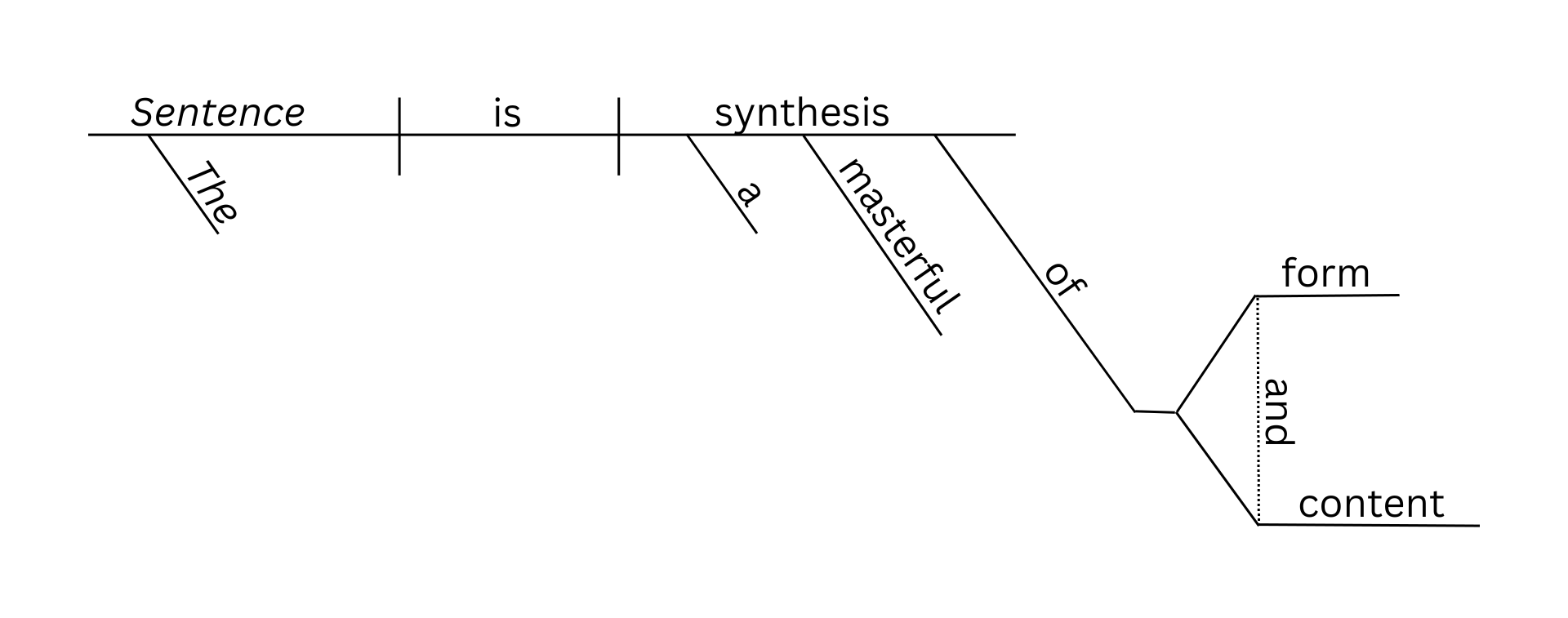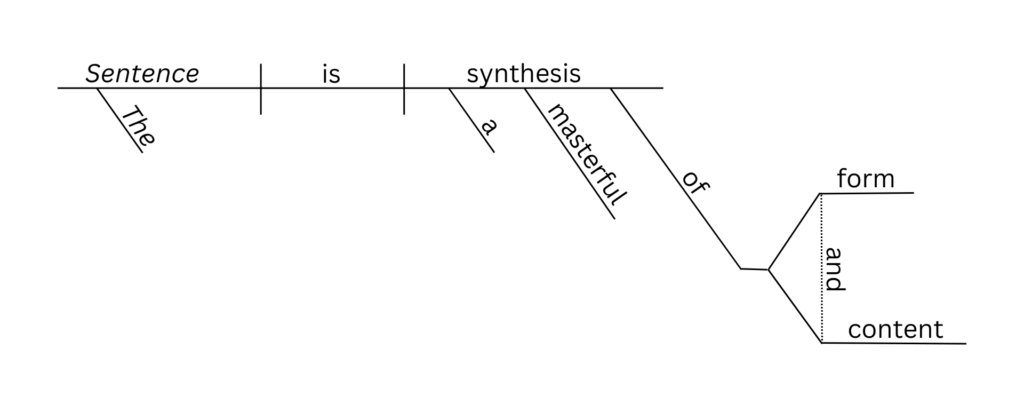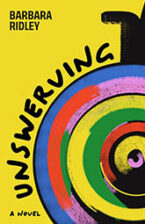Interviewed by Serenity Dieufaite

Abigail Cloud and Haley Souders were interviewed on September 11th, 2024. This interview took place in East Hall at Bowling Green State University. Abigail Cloud is the Editor-in-Chief of MAR, and Haley Souders is serving as the Winter Wheat Coordinator this year.
During this interview, we discussed preparing for Winter Wheat 2024. We talked about the festival’s history, favorite memories, and all the work that goes into making Winter Wheat.
Interviewer:
Okay, then. Let’s get started. So my first question is: Where did the idea of Winter Wheat come from? This is my first time here at Bowling Green and it’s my first time being involved in these things. So, I don’t really know a lot of the background of this event.
Abigail Cloud:
Winter Wheat started in 2001. It was actually my first year here as a grad student back then … The idea was to create a community-based writing event because there weren’t any around here. You know we have the ginormous AWP conference. We have other sort of regional conferences but there wasn’t any variety in like smaller festivals that were not gonna cost people a lot to go to. So the idea was to create something that had readings, that had sort of camaraderie among writers, which is what Mid-American Review is all about. And then also to generate new work beacuse a lot of conferences don’t involve creating new work at all. Like that’s not something that exists at most conferences and festivals so that was really the focus from the start. And that’s why the name ultimately became Winter Wheat because we’re planting the seeds for future harvest, essentially. And it speaks to our Midwestern status and everything, but in point of fact the alternate name was Wheat Stalk. So like Woodstock. But ‘stalk,’ like stalk of wheat, and you know that’s, we’re very clever. But it was mainly to create an event that the area was lacking and that didn’t really exist in the landscape anyway.
Interviewer:
Okay. Anything you want to add, Haley Souders?
Haley Souders:
No, Abby knows the history way more than I do so.
Interviewer:
Okay then so I didn’t know you were here when Winter Wheat started.
Abigail Cloud:
Yes.
Interviewer:
You got to watch that process.
Abigail Cloud:
I did. I was very involved in that process as a grad student. Karen Craigo and Michael Czyzniejewski involved all us grad students in the planning and the creating. We were all on sort of micro committees to get things done because it was our first time, too, with that big of an event. And it was still small, but it was, you know, learning the planning at a university. Like learning the offices and people that you need to talk to. And figuring out what the structure was going to be like, you know, getting, getting the guests locked down. All that kind of stuff. So it was, it was pretty detailed, pretty intense.
Interviewer:
Wow.
Abigail Cloud:
Good couple months.
Interviewer:
Okay then. So you had a very extensive history with Winter Wheat. What is one of your favorite Winter Wheat memories?
Abigail Cloud:
(to Haley) Do you have a favorite Winter Wheat memory from last year?
Haley Souders:
I don’t know. The thing I’m just thinking about right now is when me and Caleb were bringing in all the food from your car. I don’t know why that’s sticking in my head. Just like setting up all the snacks and the coffee station. And then Mays (Kuhail, 2023 coordinator) coming in and saying, “Actually you should put the pastries by the coffee.” And it was being, her being really aware of the flow of everything.
Abigail Cloud:
Yeah, yeah. It’s been interesting having that ability of, we have our own sort of coffee corner and coffee and snack corner, which we do now instead of getting catering. And it’s nice because we can have exactly what we want. No more, no less. It just, it does make things really nice.
Haley Souders:
Yeah.
Abigail Cloud:
I think most of my favorite memories from Winter Wheat are from years where I wasn’t in charge. Because I was able to go to workshops. And so, the one that I always use as an example is going to Mary Biddinger’s workshop on Organizing a Poetry Manuscript, a full-length collection. And I went because I had a manuscript and after I came out and I sat down. And I didn’t go to anything else. I sat down with, you know, my list of poems and all my poems. And I reorganized the whole manuscript, or started to, under an entirely different principle that I had gotten while in that workshop. And that is essentially the form in which that book eventually got published. So it changed everything, right on the, right on the spot, which was really incredible.
Interviewer:
So you got to experience what the purpose of Winter Wheat was.
Abigail Cloud:
I did. I did. It fulfilled its goals. And we love Mary anyway. I mean she’s an alum from here too. And is over at Akron and runs the poetry press there. So it was especially neat. It was special to have that from her with whom we’ve already had a connection.
Interviewer:
Okay. Awesome.
Haley Souders:
Yeah, in terms of workshops. I remember there were two people who came in from some other university and they, it was essentially like Hermit flash, I think is what it was.
Abigail Cloud:
Oh yeah. Yeah.
Haley Souders:
Where they were–they would give us two note cards and one was like a weird topic and then one was like a weird format to write on. So some were literally like a concert ticket was the format, or academic essay is I think one that I got. And that one was like a really fun intensive workshop.
Abigail Cloud:
Yeah, getting exposed to new forms and new ways of doing things that other people have tried and that’s always an exciting moment, I think, at Winter Wheat.
Haley Souders:
Yeah.
Interviewer:
Cool. So what does the planning process for this event look like?
Abigail Cloud:
So, we have an extensive to-do list between us. And it is organized essentially by how far ahead of Winter Wheat it is. So it’s kind of monthly and then it becomes every few weeks and so on. And we kind of divide up where we are and the duties for Haley Souders or whoever is in that position are dependent on what that person wants to learn and what they might be good at. But also it’s a lot of that outside communication. And then for me it’s dealing with the university offices. So, you know, working with event planning, emailing parking services, things like that. So, the nice thing is that Winter Wheat has been around long enough that we know what we need to do. Like there aren’t usually big surprises. It’s always possible. But not common. So, we usually are planning far enough in advance that we know who the guests are. We’re calling for proposals and so on. But even that doesn’t happen as far in advance as a lot of conferences because we know what we need. And enough people are repeat Winter Wheat attendees that they also know, they know what to do. So a lot of web mastering and updating and a lot of kind of back end stuff preparing the various spreadsheets that we need. But, but yeah. (to Haley) What has it been looking like for you?
Haley Souders:
Yeah, I mean I think for me it’s at least a little bit less stressful just because you have done this a decent amount of times. And like you were saying with the responsibilities it’s laid out on a sheet, on a Google doc. It’s like you know everything that needs to get done. There’s nothing that’s going to fall through the cracks. So there isn’t anything that I’m having to stress out about it not getting done.
Abigail Cloud:
Yeah. Yeah. We have all the contact lists already made. They need to be updated but they’re already made so you know it’s just stuff that needs to be done. But also has a time already assigned to do it.
Interviewer:
Okay then. How do you organize the workshop schedule?
Abigail Cloud:
I actually changed how we do that.
Interviewer:
Okay.
Abigail Cloud:
Usually, it is the coordinator and I sitting down with slips of paper that have the workshop title, genre, and preferred date on it. Last year, I gave those slips to the (Mid-American Review editorial) class and said here you go everybody. Make a schedule. And I had input and everything but I let everyone else puzzle it out. And figure out what would be the best arrangement. And I had to make changes, of course, but honestly it was kind of interesting to watch that puzzling process.
Haley Souders:
Interesting. I know I haven’t gone through that scheduling yet but one of the things that I have done so far is starting to make a spreadsheet of those different proposals. And what you’re saying with like the date, preferences, and genres.
Abigail Cloud:
Yeah, and there are fewer preferences than there used to be. Like we used to have to ask people for their, whether they wanted the projector and screen in their rooms or not. And now they’re in all the rooms that we’re in so we don’t have to ask about that anymore. We used to have to get a certain number of laptops from the union which was horrible. And then remember all the logins and everything. It was awful.
Interviewer:
Where is Winter Wheat held, by the way?
Abigail Cloud:
Education Building. Yup. Right there. So it’s right close to our parking lot, our preferred parking lot. And so it’s good for accessibility reasons. They also have those rooms often set up with active learning desks. So we can move them around really easily. … But it is nice to have a stable setting. We used to be in the union. It was in the union every year for the longest time but it’s pretty expensive. And we also can only have the university catering if we’re in that building. So I can’t, like, bring the Keurigs and set them up. They won’t let us do that. So, it’s nice to have the Education Building. It could be, there are things that could be better about it. But, you know. And it’s better than having it here in East Hall, which we did the first year. That was, this was where it was. There were only about 40-60 people anyway. So we fit. But, but I don’t want to do that with like 200 people.
Interviewer:
So 200 is what we’re expecting to get this year?
Abigail Cloud:
Anywhere between 200 and 300. And that counts the audience at the Thursday night reading which the Prout students are required to go to. So usually we are tapping out around 300.
Interviewer:
Okay, I noticed there’s going to be a book fair. Can you tell me about the process of getting books, reaching out to writers, literary journals?
Haley Souders:
Yeah, I mean that was part of what I was doing in August. There’s a list of different contacts for different presses and journals that has been used for a while now, I’m guessing.
Abigail Cloud:
Yeah.
Haley Souders:
So I basically reached out to those emails. And there was a pre-used template that Mays and the other Winter Wheat coordinators have used that is kind of just advertising the book fair and asking if they want to be part of it again to fill out a certain form so that we know. I know later on we’ll have to start asking about like logos and marketing materials that they’ll use at the book fair. Yeah.
Abigail Cloud:
We make a good, a logo handout and on the website so that people know who’s going to be there. We also, so it could be journals, could be creative writing programs, could be writer groups, could be presses. And then, we also have a table where we sell the presenters’ books. So not just the guest readers but also anyone who’s presenting a workshop if they have a book we will sell it for them. They bring us copies and we of course make a spreadsheet and everything. How many do we have? How much are we selling them for? And that’s an important part of the book fair too because we don’t pay our presenters. It’s a free festival so we want to at least be able to offer them something.
Interviewer:
How many writers and presenters do you have planned for this year?
Haley Souders:
I think so far in the spreadsheet there’s about 15 people.
Interviewer:
15?
Haley Souders:
15. And then I know that you guys will also be doing workshops. So that’s like 10 more. Unless you pair up.
Abigail Cloud:
It’ll be up to like 30 to 35, I would say.
Interviewer:
Okay.
Abigail Cloud:
Yeah. Yeah. That’s the total that we would normally have. We had been up to like 60 different workshops a couple of years, which was bonkers. We don’t do that. That’s, that was like 10 running at a time.
Interviewer:
Wow.
Abigail Cloud:
Yeah, and that was too many. So having closer, anywhere between 30 and 40 is much more manageable.
Interviewer:
Okay then. What would you say is your favorite part of the process of working on Winter Wheat?
Haley Souders:
So far, I’ve really enjoyed getting to see the proposals before they’re released. And just getting to see everyone’s descriptions of what they want to do. And the workshops that they want to lead especially if it’s more unique and something that I would never have thought of for my own writing.
Interviewer:
Cool.
Abigail Cloud:
My answer is, is strange but it, it’s kind of in keeping with my personality. I really like as registrations are coming in, getting them logged. And seeing what people are going to and getting the counts of who’s signing up for what.
Haley Souders:
Oh yeah.
Abigail Cloud:
Yeah, I have a special spreadsheet setup that does lookups. So all I have to do is change a number and it’ll look up the person who’s registered and then print a schedule of everything they’re registered for. And it’s one of my favorite things. I love this thing. It’s so interesting to have that and to be able. I could even set it up to do merge list or like a mail merge. And to just run down the list, but that’s a little too intensive because I need to be able to check it. But it’s just nice to have been doing something so long that we do have a little bit of automation available. Which seems really strange but it’s true. It’s super true.
Interviewer:
Can you describe a challenge that you’ve had during the preparation process?
Abigail Cloud:
Rooms. Having rooms. So, the last couple of years we’ve really gotten lucky because Veterans Day has fallen on one of the days that we have Winter Wheat. So it, getting enough rooms on a weekday hasn’t been a problem. But this year it is because they’re classes in the Education Building up until a certain time on Friday. So we’re going to have to mess with the schedule a little bit to make sure that we have enough space. I think it’s going to work but it is sort of that type of thing that it’s going to hang over our heads because we can’t solve that problem until we know what workshops we have and when they’re going to be. So it’s kind of on pause, like it has to be on the back burner. And that is not an uncommon problem. But it is an issue that shows up almost every year so it’s solvable. But it is annoying. It is a nuisance, for sure.
Haley Souders:
Yeah, I think that’s probably the biggest issue there is. I know that one thing I ran into when contacting people for the book fair is just like journals going defunct and being on the list still. Which is just kind of sad to see. More so than it being like a problem.
Abigail Cloud:
Yeah. Yeah.
Haley Souders:
Like, oh, I can’t send them an email, and more of like, oh, this is sad that this journal that has probably been pretty important to the community is now not there.
Abigail Cloud:
Yeah. And it’s really kind of in some ways a sign of the times too. It’s just, you know, it’s not unusual to find journals going defunct but fortunately, there are others being created. So we just …
Haley Souders:
Yeah.
Abigail Cloud:
Swap in some information. …
Interviewer:
Is there anyone you’re looking forward to working with during this year’s Winter Wheat?
Abigail Cloud:
I’m stoked to have Jennifer Pullen coming. She teaches at Ohio Northern. And just had a fantasy fiction craft text come out. Craft text, text and anthology. So she’s going to read from her own work and talk a little about that book at the keynote. But then she’s also going to lead a craft workshop on Fantasy fiction. So I’m stoked about that because it’s nice to have sort of something that we don’t offer our students here in the program. We don’t have a fantasy expert. And that’s really what we try to do with that keynote spot, bring in someone doing something different than what we do here. Or someone who has a different perspective or experience. And plus I just, I’ve known her for a long time so I’m just excited that I get to feature her this year. It’s just fun.
Interviewer:
Cool.
Haley Souders:
Yeah. Jessica Dawn Zinz-Cheresnick. She’s doing, I think, a workshop on found images in poetry which seems like it’ll be interesting. I don’t know if I go to workshops or not.
Abigail Cloud:
You do. You do. If we can possibly make it happen. Then you do for sure.
Haley Souders:
Yeah. That seems like it’ll be an interesting one.
Interviewer:
What is it like working with graduate and undergraduate students for Winter Wheat?
Abigail Cloud:
Fun. I think it’s fun.
Haley Souders:
I think you work more with the undergraduates and graduates so far than I have.
Abigail Cloud:
It’s hard to wrangle a lot of people to do, you know to, for the volunteer work thing, which does fall on you eventually.
Haley Souders:
Oh yeah.
Abigail Cloud:
But it can be hard wrangling volunteers. You know what’s hard: It’s getting people to understand that when they’re volunteering for Winter Wheat they might be sitting and doing nothing for a while. And that’s okay because they are still monitoring. Like, your presence is the volunteering, like you’re monitoring a table or, you know, you’re a person who is present and that someone could ask questions of. But when people volunteer a lot of times they get a little sticky about it. Because it’s just like, oh, I really want to do something. Like sometimes sitting is doing something. Or a lot of times I’ll send them to a workshop to fill a space to, you know, be another presence. So it’s always a little bit funny trying to coordinate that. And help them understand what’s expected, which sometimes is nothing.
Interviewer:
Interesting.
Haley Souders:
Yeah, I don’t have anything to add to that.
Abigail Cloud:
Yet.
Haley Souders:
Yet.
Abigail Cloud:
You will. You will though.
Interviewer:
Okay, here’s my final question. Is there anything about preparing for Winter Wheat that we haven’t discussed that you would like to mention?
Abigail Cloud:
I want people to come with an interest in doing something a little bit new. Something that’s a little bit outside what they’ve done before. And be prepared to create on-site, on the spot. It’s nice to go somewhere where you don’t feel like you have to do a lot of studying or research or, you know, prewriting or anything like that before you come. You can just come and be. Be a creator. And give yourself that time to be a creator. I think that’s really important. I also really want people who sign up to come. Sometimes we get a lot of registrants who don’t come then, and you know there are appropriate reasons for something like that happening. But also, sometimes I think people get tired and whatever and you know the, the inertia. The energy requirement to overcome the inertia can be a lot. But most people find it really relaxing and really renewing. And I want people to feel that and be prepared for that.
Interviewer:
Well, thank you both for allowing me to interview you.
Abigail Cloud:
Of course. Thank you.
Interviewer:
And I hope that you have a successful Winter Wheat.
Haley Souders:
Thanks
Abigail Cloud:
Winter Wheat!




